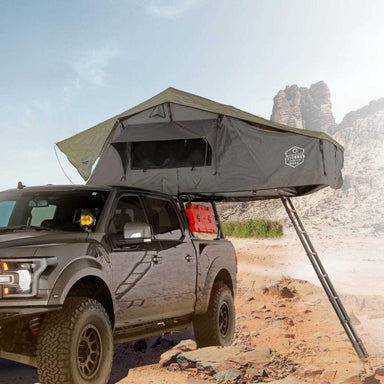 Sale
Sale
Impressive Bang For The Buck Roof Top Tent Discover the great outdoors with the Nomadic Extended Roof Top Tent by Overland Vehicle Systems. It ...
View full detailsThis article explores the rise of roof top tent camping and its health benefits, offering a comprehensive look at how this modern approach to camping enhances the connection with nature and may contribute to overall well-being.
Overland roof top tents, mounted atop vehicles, provide a unique, elevated camping experience that offers numerous practical advantages over traditional ground tents, such as ease of setup, comfort, safety, and mobility.
The health benefits associated with spending time in nature through roof top tent camping can be substantial, encompassing mental, physical, and cognitive improvements. This article also addresses the practical considerations of roof top tent camping, such as cost, vehicle requirements, and accessibility, and looks toward future directions and research in the field.

In recent years, the allure of the great outdoors has been rekindled, with more people seeking ways to immerse themselves in nature. Among the various methods of exploring the wilderness, roof top tents have emerged as a captivating and increasingly popular option.
Mounted atop vehicles, rooftop tents offer a unique camping experience that elevates adventurers above the ground, literally and figuratively. Their rising popularity is a testament to a growing trend of seeking solace and adventure away from the confines of traditional urban living.

This article aims to delve into the health benefits associated with spending time in nature, particularly through the lens of overland roof top tent camping. We will explore how this modern twist on traditional camping can not only enhance your outdoor experience but also contribute positively to your physical and mental well-being. Join us as we venture into the world of roof top tents and discover the therapeutic powers of nature.
Roof top tents are an innovative form of camping gear that differ significantly from traditional ground tents. Mounted on vehicles or trailers, these tents offer a unique camping experience. Unlike ground tents that are pitched on the earth, roof top tents are elevated and attached to a vehicle's roof rack system, crossbars, or a truck’s bed rack. This elevation not only offers a unique vantage point but also keeps campers away from ground-level annoyances like dampness, uneven terrain, and small critters.
To get a comfortable horizontal sleep, it is true that rooftop tents also need to be level. However, this can easily be achieved by bringing along small wooden blocks or readymade RV plastic ramps, that can be strategically placed under the tires. Generally, it is easier to level a vehicle than to find level ground for a traditional ground tent.
The practical advantages of overland rooftop tents are numerous. One of the most significant benefits is the ease of setup. Unlike traditional tents, which can be time-consuming and sometimes complex to pitch, roof top tents typically unfold and are ready to use in a matter of seconds or minutes. This convenience allows campers to spend more time enjoying their outdoor experience and less time dealing with setup challenges.
In terms of comfort, roof top tents often provide a more comfortable sleeping environment. Elevated from the ground, they tend to be less affected by the cold and moisture that can seep into ground tents. Many models come with built-in mattresses, further enhancing the comfort level compared to the often thin sleeping pads used in ground tents.
Safety is another key advantage. Being elevated from the ground, roof top tents offer a sense of security from some wildlife and any ground-level disturbances. This elevation can be particularly reassuring in areas with snakes and scorpions.

Mobility is a hallmark of overlanding, and historically rooftop tents have their roots in safari expeditions in Africa and Australia, where an elevated sleeping platform was necessary for safety from wildlife. Because they are mounted on a vehicle, it’s easy to move from one location to another when searching for the "Big Five" (lion, leopard, rhino, elephant, and African buffalo) or other exotic animals.
Over the years, they have gained popularity among overlanders and adventure travelers worldwide. In recent times, there's been a noticeable trend towards more luxurious and feature-rich rooftop tents, catering to a growing demographic seeking comfort alongside adventure. This trend reflects a broader shift in the camping and outdoor industry, where convenience and comfort are increasingly prioritized.
In summary, overland roof top tents offer a unique and practical alternative to traditional camping methods. Their ease of setup, comfort, safety, and mobility, combined with their historical roots and growing popularity, make them an attractive option for modern campers seeking adventure with a touch of convenience.
Spending time in nature is not just a leisure activity; it has profound health benefits that are increasingly being recognized by medical research. This connection is particularly relevant when considering the use of roof top tents, which offer a unique way to immerse oneself in the natural environment.
A plethora of studies have highlighted the mental health benefits of interacting with nature. A pivotal study published in the International Journal of Environmental Research and Public Health found that spending time in green spaces significantly reduces stress and alleviates symptoms of anxiety and depression. Another research piece in the Journal of Affective Disorders reports similar findings, emphasizing how nature exposure can lead to improvements in mood and mental well-being.
The advantages extend to physical health as well. Research in the Journal of Epidemiology and Community Health has shown that regular exposure to natural environments is linked to improved cardiovascular health. This is attributed to both the relaxing effects of nature and the physical activity often involved in navigating these spaces. Additionally, outdoor activities, such as camping with roof top tents, increase exposure to sunlight, which is a crucial source of Vitamin D – a vital component for bone health and immune function, as per findings in the American Journal of Clinical Nutrition.

The impact of nature on cognitive functioning and creativity is another area of growing interest. A study in the Journal of Environmental Psychology revealed that participants who spent time in natural settings showed significant improvements in problem-solving skills and cognitive function. This is attributed to the restorative effect of natural environments, which can foster a creative mindset – an aspect particularly beneficial for individuals seeking a break from the monotony and demands of urban life.
In conclusion, the health benefits of immersing oneself in nature are substantial, encompassing mental, physical, and cognitive aspects. Overland roof top tents provide an accessible and unique way to connect with the natural world, amplifying these health benefits and promoting a lifestyle that embraces the healing power of nature.
Roof top tents are revolutionizing the way people interact with the great outdoors. By elevating the camping experience, quite literally, these tents offer a unique vantage point to appreciate nature. Unlike traditional ground tents roof top tents provide a bird's-eye view of the surroundings.
The immersive experience of sleeping in a roof top tent is akin to having a personal treehouse. It brings a sense of adventure and closeness to nature that is hard to replicate in a standard camping setup. There's something quite magical about drifting off to sleep under the stars, elevated above the earth, with the gentle rustling of leaves or the distant call of nocturnal animals as your lullaby.

Many individuals have found this elevated way of camping to be transformative. Take, for instance, Sarah and John, a couple from Colorado, who discovered a newfound appreciation for nature through their rooftop tent excursions. "It's like you're part of the landscape, not just a visitor," Sarah explained. Their numerous trips to the Rockies have not only deepened their connection with nature but also strengthened their bond as a couple.
Similarly, Alex, a photographer from Oregon, credits his roof top tent for enhancing his nature photography. "Being above ground level gives me a unique perspective for my sunrise and wildlife shots," he says. The convenience of being able to camp in remote locations without the hassle of setting up a traditional tent has allowed him more freedom to capture breathtaking moments.
These stories echo a common theme: overland roof top tents are not just a means of accommodation; they are a gateway to a more profound, more connected experience with nature. Whether it's for the views, the adventure, or the convenience, rooftop tents are changing the way people camp and interact with the natural world around them.

Roof top tent camping, an innovative approach to outdoor adventures, presents unique health benefits when compared to traditional ground-based camping. Both methods share common advantages, such as increased physical activity, reduced stress levels, and enhanced mental well-being. However, overland rooftop tents may offer additional health benefits due to their unique features.
One of the primary distinctions is the elevation aspect of roof top tents. Being elevated from the ground may lead to a less dusty environment with improved air quality and reduced exposure to ground-level allergens, dampness, and pests. This elevation may contribute to better respiratory health and a more comfortable sleep environment, crucial for overall wellness. Furthermore, the ease of setup associated particularly with hard shell roof top tents means less physical strain during the camping setup process, which can be beneficial for individuals with physical limitations or those who prefer a more straightforward and often time-saving camping setup.
Overland roof top tents may encourage more frequent and longer camping trips due to their convenience and comfort. The ease of setup and takedown, combined with the mobility of having a tent attached to a vehicle, makes spontaneous and extended trips more likely. This increased accessibility to nature can have profound positive effects on health.
Studies have shown that regular exposure to nature is beneficial for mental health, reducing symptoms of depression and anxiety. The accessibility of roof top tents can lead to more frequent short-term getaways, potentially offering more consistent mental health benefits compared to traditional camping, which often requires more planning and preparation.
Research on the health benefits of regular nature exposure indirectly supports the potential advantages of roof top tent camping. For instance, studies indicate that spending time in natural environments can lower blood pressure, reduce stress hormone levels, and improve mood and cognitive function. These benefits are attributed to factors such as increased physical activity, exposure to natural light, and the calming effect of natural surroundings.

While these studies don't specifically focus on roof top tent camping, they highlight the importance of regular and easy access to natural environments for health. Overland roof top tents, by facilitating more spontaneous and frequent camping experiences, align well with these findings, suggesting that they could be an effective way to enjoy the health benefits of regular nature exposure.
When considering the shift to roof top tent camping, potential campers face a few significant barriers: cost, vehicle requirements, and accessibility.
Roof top tents can be a significant investment. Prices range widely, but entry-level quality tents often start at just below one thousand dollars and can go up to several thousand. This cost can be prohibitive for casual campers or those on a tight budget. However, there are solutions. Firstly, consider looking for second-hand tents in good condition. Many outdoor enthusiasts upgrade their gear regularly, offering an opportunity to purchase gently used tents at a lower cost. Additionally, some companies offer rental services for overland rooftop tents, which can be a cost-effective way to try before you buy.
Not all vehicles are suitable for roof top tents. The primary consideration is the roof's dynamic and static load capacities. Most small to large SUVs and trucks can accommodate a rooftop tent, but smaller passenger cars may struggle. It's essential to check the vehicle manufacturer's guidelines before purchasing a tent. For those with smaller vehicles, ground tents remain a viable and more accessible option. Alternatively, some companies specialize in smaller, lighter rooftop tents designed for compact cars.

Accessing a roof top tent requires a bit more physical effort than traditional camping. Climbing into the tent may be challenging for some individuals, including small children, those with mobility issues, and even pets. To address this, look for tents with user-friendly designs, such as lower entry points and easy access doors, or tents with built-in ladders that are sturdy and easy to maneuver. Some overland roof top tents even come with accessories for the ladder, which makes it easier for your furry friend to enter.
For first-time roof top tent users, experts recommend starting with a trial run close to home. This allows campers to familiarize themselves with the setup and takedown process in a low-stress environment. Additionally, joining online forums or local camping groups can provide valuable insights and tips from experienced roof top campers. Many outdoor and overland retailers also offer workshops or personalized advice for those new to this style of camping.
In summary, while roof top tent camping presents certain challenges, with the right information and preparation, it can be an incredibly rewarding experience. It opens up a world of camping possibilities, often in comfort and with unique views that traditional camping can't match.
As overland roof top tents continue to gain popularity among outdoor enthusiasts, there are several areas where further research is imperative to enhance our understanding and improve the experience.
These research directions not only aim to address the direct impacts of rooftop tents on health and the environment but also seek to forecast the future of rooftop camping in light of evolving outdoor recreation trends and environmental sustainability concerns.
Future studies should focus on the ergonomic design of rooftop tents and their potential impact on physical health. This includes researching the effects of sleeping at an elevated height, the ease of access, and the quality of sleep compared to traditional ground tents.

Another area of interest is the psychological impact of roof top camping. Research could explore how elevated sleeping environments affect mental health, stress levels, and overall well-being. Understanding these aspects can lead to design improvements that maximize the therapeutic benefits of outdoor experiences.
There is a need for comprehensive research into the safety standards of roof top tents. This includes studying the stability and structural integrity of tents in various weather conditions and the potential risks involved in mounting and using these tents on different vehicle types.
As environmental concerns become more prominent, there is a growing need to research and develop eco-friendly materials for overland rooftop tents. This includes exploring sustainable production methods, recyclable materials, and the overall carbon footprint of these tents from manufacturing to disposal.
Research should also be conducted on the environmental impact of roof top camping. This includes studying the effects on wildlife and natural landscapes, particularly in sensitive ecosystems, and how rooftop tents compare to traditional camping methods in terms of environmental footprint.

Another promising research avenue is the integration of green technologies with overland rooftop tents. This includes the use of solar panels for energy, rainwater harvesting systems, and other innovative features that promote self-sufficiency and reduce the environmental impact of camping.
With the rise of electric and hybrid vehicles, adapting rooftop tents to these vehicles will be crucial. This includes ensuring energy-efficient designs that do not excessively drain vehicle batteries and exploring solar-powered options.
Understanding the evolving trends in outdoor recreation is crucial. Future research should examine how roof top tents fit into the broader trends of outdoor activities, especially considering the growing interest in off-grid and remote camping experiences.
The impact of technological advancements on overland roof top camping is another vital research area. This includes the development of smart tents equipped with IoT devices, climate control systems, and other modern amenities that could redefine the camping experience.
Finally, exploring the social dynamics and community aspects of roof top camping could offer insights into its future. This involves studying how these tents are shaping camping culture, their role in fostering a sense of community among campers, and the potential for rooftop tents to become a mainstream option in outdoor recreation.
In this exploration of roof top tents, we've uncovered a world where camping is redefined, offering unique advantages that enhance our connection with nature and may contribute to our overall well-being. These innovative tents, perched atop vehicles, provide an elevated escape from the ordinary, bringing a blend of adventure and convenience to outdoor enthusiasts.
Roof top tents serve as a valuable tool in our quest for health and well-being. By facilitating effortless and frequent immersions in nature, they amplify the therapeutic effects of the outdoors. The mental relaxation, physical rejuvenation, and cognitive refreshment offered by nature are within easier reach, thanks to the convenience and accessibility of rooftop tent camping.
As we conclude, consider this an invitation to rekindle your relationship with the great outdoors. Overland roof top tents present an opportunity to elevate your camping experience, both literally and metaphorically. Whether you seek a serene retreat from urban chaos or an adventurous escape amidst the wilderness, these tents are a gateway to a world of healthful and memorable experiences.
So, pack your bags, set up your rooftop tent, and embark on a journey to explore the unparalleled beauty and tranquility of nature.

 Sale
Sale
Impressive Bang For The Buck Roof Top Tent Discover the great outdoors with the Nomadic Extended Roof Top Tent by Overland Vehicle Systems. It ...
View full details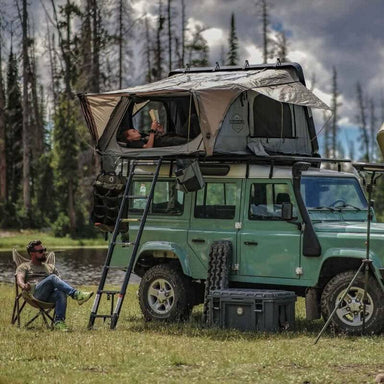 Sale
Sale
OVS Bushveld Hard Shell Roof Top Tent - The Ultimate Adventure Companion Bushveld is the latest 2-person or 4-person Heavy Duty Hard Shell Roof...
View full details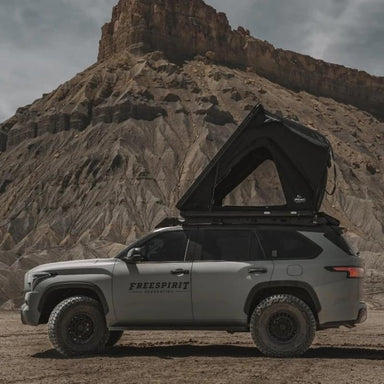 Save $0.00
Save $0.00
The Lightest 4-Season Aluminum Roof Top Tent On The Market! Boom, it’s finally here AND with FREE SHIPPING to the lower 48 states, saving you $...
View full details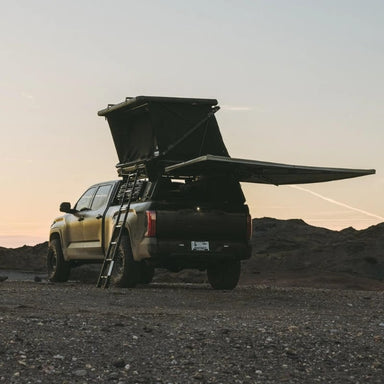 Sale
Sale
Join the Future of Rooftop Tents with Freespirit Recreation Evolution V2 Hey, fellow trailblazers! Get ready to crank up the dial on your adve...
View full details Sale
Sale
Explore Comfortably with ROAM Vagabond XL Tent ROAM Vagabond XL Rooftop Tent revolutionizes camping with its quick setup and robust constructio...
View full details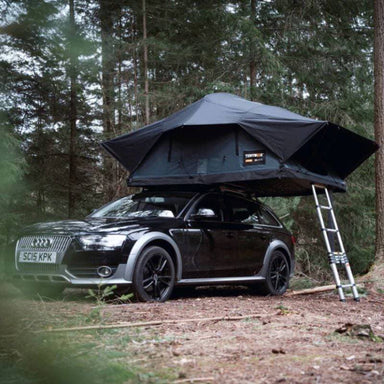 Sale
Sale
Embrace the Wild With The TentBox Lite And Turn Your Daily Driver Into An Adventure Vehicle Of A Lifetime! Hey there, fellow adventurers! Are y...
View full details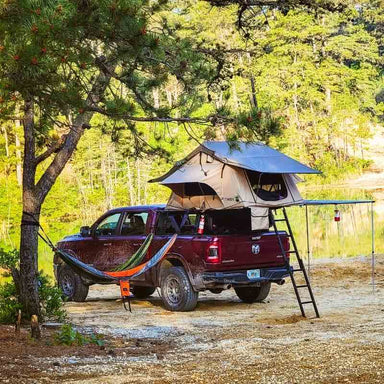 Sale
Sale
Budget Roof Top Tent Ready For Your Next Adventure Without Compromising Quality PLEASE NOTE THAT THE ANNEX FOR THE OVS TMBK 3 ROOF TOP TENT IS ON ...
View full details Sale
Sale
Classic Soft Shell Roof Top Tent With Great Value for Money If you're looking for a Soft Shell Roof Top Tent with a classic design that is rigid an...
View full details Save $150.00
Save $150.00
OVS XD Lhotse Hard Shell Roof Top Tent Overview Introducing the Overland Vehicle Systems XD Lhotse Clamshell Aluminum Hard Shell Roof Top Tent ...
View full details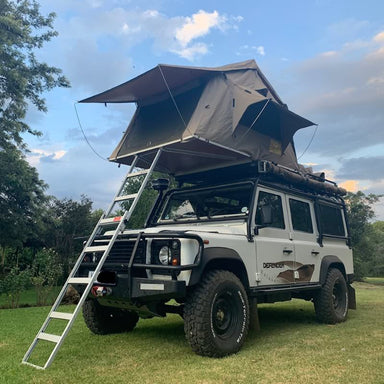 Sale
Sale
Eezi-Awn Series 3 - Hands Down The Best Soft Shell Roof Top Tent On The Market This is the tent we use ourselves. For years of overlanding the ...
View full details Save $700.00
Save $700.00
OVS Sidewinder - Built Tough To Take A Beating It doesn’t get much more Hard Shell than this! The Sidewinder from Overland Vehicle Systems is among...
View full details Save $600.00
Save $600.00
Durable Aluminum Body Hard Shell Roof Top Tent If you're looking for a 3-season mid-level rooftop tent that is both reliable and durable the Mamba ...
View full details Save $0.00
Save $0.00
Tuff Stuff Alpha Roof Top Tent - Your reliable Outdoor Companion Elevate your camping adventure with the Tuff Stuff Alpha Roof Top Tent. Designed...
View full details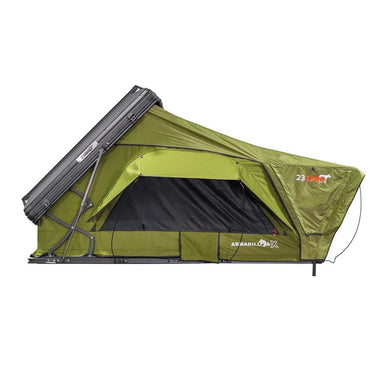 Save $0.00
Save $0.00
23ZERO Armadillo AX3 Aluminum Hard Shell Roof Top Tent Overview The 23ZERO Armadillo AX3 is a high-end aluminum hard shell rooftop tent built for...
View full details Sale
Sale
Elevate Your Adventure With Breezeway 2.0 Soft Shell Roof Top Tent Discover the Breezeway 2.0, a lightweight soft-shell roof top tent designed fo...
View full details Save $0.00
Save $0.00
23Zero Walkabout 62 2.0 Soft Shell Roof Top Tent – Your Ultimate Overland Companion Embark on your next adventure with the 23Zero Walkabout 62 2....
View full details Sale
Sale
23ZERO Walkabout 87 2.0 Soft Shell Roof Top Tent Overview The 23ZERO Walkabout 87 2.0 is a premium 4-season soft-shell rooftop tent designed for ...
View full details Sale
Sale
23ZERO Walkabout 72 2.0 Soft Shell Roof Top Tent Overview The 23ZERO Walkabout 72 2.0 is a soft-shell rooftop tent designed to comfortably accomm...
View full details Sold out
Sold out
23ZERO Armadillo X2: Your Ultimate Overlanding Companion Elevate your overlanding adventures with the Armadillo X2 hardtop rooftop tent. This sid...
View full details Save $0.00
Save $0.00
23ZERO Armadillo A2 Right Side Only Hard Shell Roof Top Tent Overview The Armadillo A2 Right Side Only Hard Shell RTT by 23ZERO is a rugged, aero...
View full details Sold out
Sold out
23ZERO Armadillo A3 Left Side Only Hard Shell Roof Top Tent Overview Embark on your next adventure with the 23ZERO Armadillo A3 Left Side Only Ha...
View full details Save $0.00
Save $0.00
23ZERO Armadillo AX2 Aluminum Hard Shell Roof Top Tent Overview The 23ZERO Armadillo AX2 is a premium aluminum hard shell roof top tent designed ...
View full details Save $0.00
Save $0.00
23ZERO Kabari 2.0 Hard Shell Roof Top Tent Overview The 23ZERO Kabari 2.0 wedge hardshell rooftop tent transforms your vehicle into a mobile camp...
View full details Save $0.00
Save $0.00
23ZERO Kabari 3.0 Sleek Wedge Hard Shell Roof Top Tent Overview Embrace the freedom of the open road with the 23ZERO Kabari 3.0, a rooftop tent t...
View full details




